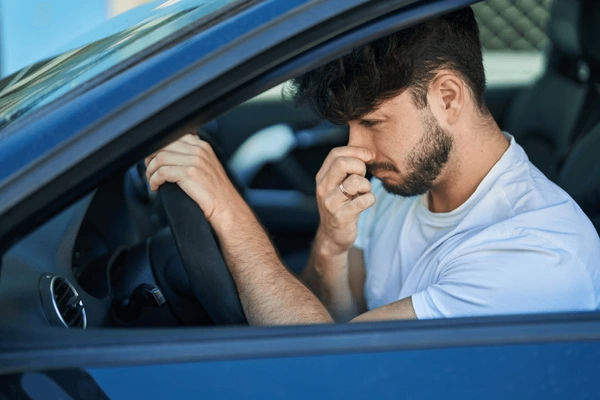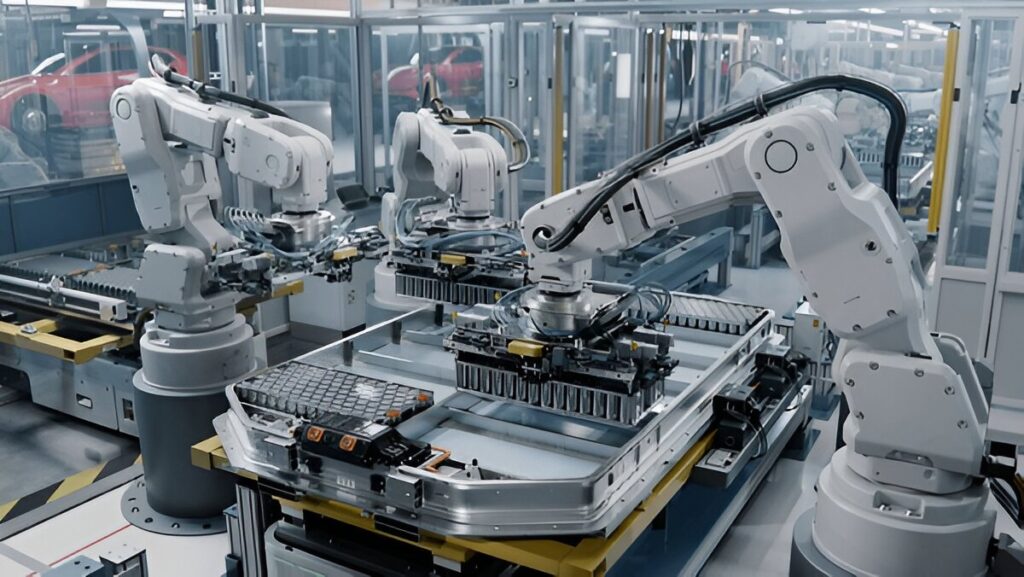Image Credit: Shutterstock
Understanding the Causes of Gas Smell in Cars
There are several reasons why you might be smelling gasoline in your car. Some causes are minor, while others could signal a serious problem. Identifying the root cause is crucial for effectively addressing the issue.
1. Common Reasons for a Gas Smell in Your Car
Most commonly, a gas smell inside your car may occur due to minor issues, such as spilled fuel during refueling, a malfunctioning fuel cap, or a dirty cabin filter. These issues are usually easy to resolve with some basic maintenance. However, if the smell persists, it could indicate a more significant problem.
Also Read: How to tell your crush you like them
2. Potentially Dangerous Fuel Leaks or Evaporation
In more serious cases, a fuel leak could be the cause of the persistent odor. Fuel leaks often occur in the fuel tank, fuel lines, or even around the injectors. Gasoline evaporates quickly, and even small leaks can result in noticeable odors. These kinds of issues can be hazardous, so it’s essential to address them immediately.
Immediate Actions to Take When You Smell Gas
If you notice the smell of gas inside your car, take immediate action to avoid any potential risks. Safety is the top priority, as gasoline vapors are highly flammable.
1. Safety Precautions for Gas Leaks
Before you do anything, make sure you are in a well-ventilated area, and avoid turning on any electrical components that could spark. If you suspect a serious leak, do not drive the car and have it towed to a professional mechanic.
2. Steps to Take If You Detect Gas Smell in Your Car
Once you’re in a safe space, check your car for any visible signs of gasoline. This includes checking for puddles of fuel underneath your car or wet spots around the fuel cap area. If you can’t locate a clear source, it’s time to investigate further.
How to Identify the Source of the Gas Smell
Locating the source of the gas smell is the first step toward eliminating it. If you’re handy with car maintenance, you can inspect the fuel system yourself, but if not, it’s always best to have a professional mechanic diagnose the problem.
1. Checking Fuel Lines and Fuel Tank
Examine the fuel lines under your car for any cracks or damage. Fuel lines often become brittle over time, leading to leaks. Additionally, inspect the fuel tank for any visible signs of wear or damage. A small crack in the tank could cause a fuel leak that leads to the smell.
2. Diagnosing Issues with Fuel Injectors and Fuel Filters
If your fuel system is leaking, it may be due to faulty fuel injectors or a clogged fuel filter. These components can sometimes malfunction and lead to a gas smell. If you’re unsure how to check them, it’s best to consult a mechanic.
DIY Methods to Eliminate Gas Smell
There are several ways you can tackle the gas smell in your car without resorting to professional help. These DIY solutions are effective for minor odors caused by spills or small leaks.
1. Using Activated Charcoal to Absorb Odors
Activated charcoal is known for its ability to absorb odors. Place a few bags of activated charcoal in your car to help neutralize the gas smell. Leave them in the car for a few days for the best results.
2. Cleaning the Car’s Interior with Baking Soda
Baking soda is another natural odor absorber. Sprinkle baking soda on the upholstery, carpets, and floor mats. Let it sit for a few hours, then vacuum it up. This should help reduce the smell significantly.
3. Vacuuming to Remove Lingering Odors
Vacuuming the interior of your car thoroughly is crucial. This will help pick up any spilled gasoline particles, which could be lingering in the fabric of the seats or carpet, contributing to the smell.
How to Clean the Car’s Air Vents and Cabin
The smell of gasoline can linger in the car’s air system if not properly cleaned. Air vents and the cabin air filter are the most common places where the odor can get trapped.
1. Disinfecting and Deodorizing the Air Conditioning System
Use a specialized cleaner to disinfect and deodorize the air conditioning system. These cleaners are designed to kill bacteria and mold, which can harbor smells. You can spray the cleaner directly into the air vents and let it circulate for a few minutes.
2. Replacing or Cleaning the Cabin Air Filter
The cabin air filter can accumulate gas fumes over time. Remove the filter and inspect it for any debris or odors. If it’s dirty, clean it or replace it altogether.
Professional Solutions for Gas Smell
If the DIY methods don’t completely remove the gas smell, or if you’re unable to identify the source of the issue, it may be time to take your car to a professional.
1. When to Seek Professional Help
If you’re not comfortable inspecting fuel lines or if you suspect a more serious issue, such as a leaking fuel tank or faulty injectors, it’s important to take your car to a trusted mechanic. Gasoline leaks can be dangerous and should be addressed as soon as possible.
2. Services Offered by Automotive Repair Shops
Mechanics can perform a thorough inspection of your car’s fuel system and air vents. They can also check for leaks, repair damaged components, and replace faulty parts. Some repair shops also offer specialized cleaning services to eliminate persistent odors.
How to Prevent Gas Smell from Returning
Preventing gas smells from returning requires regular maintenance and good driving habits.
1. Regular Vehicle Maintenance and Checks
Regularly inspecting your fuel system, air filters, and exhaust system can help catch problems early. This can prevent leaks and other issues that might cause gas odors.
2. Storing Fuel Properly to Avoid Future Spills
Be mindful of how you store and transport fuel. If you’re using your car to transport fuel for any reason, ensure that the containers are sealed properly to avoid spills.
Preventive Measures for Avoiding Gas Leaks
Taking preventive measures can help you avoid fuel leaks that lead to gas odors.
1. Checking Your Fuel Cap and Seals
Make sure your fuel cap is on tightly and that the seals around the tank are in good condition. If the seals are cracked or worn, replace them immediately to prevent gasoline from evaporating.
2. Keeping the Fuel System in Top Condition
Have your fuel system checked regularly to ensure there are no cracks or blockages. This includes checking fuel lines, fuel filters, and fuel injectors for wear.
Using Specialized Products for Gas Odor Removal
If the gas smell persists after following these tips, consider using specialized products designed for odor removal.
1. Odor Eliminators and Sprays for Cars
There are many products available in the market that are specifically designed to eliminate car odors. These sprays can be applied to the upholstery, carpets, and air vents for a fresh, clean scent.
2. How to Use Ozone Generators for Persistent Smells
For particularly stubborn odors, an ozone generator can be an effective solution. It works by breaking down odor molecules and neutralizing them. Follow the manufacturer’s instructions carefully to ensure proper usage.
Best Car Air Fresheners for Neutralizing Gas Smell
While air fresheners are not a permanent solution, they can help mask the gas smell while you work on fixing the issue.
1. Choosing Effective Air Fresheners
Look for air fresheners specifically designed to neutralize odors rather than just cover them up. Products with activated charcoal or ozone technology are highly effective.
2. Pros and Cons of Various Car Deodorizing Products
While some air fresheners work well, others may only provide temporary relief. Consider the pros and cons of each product and decide which one works best for your needs.
Conclusion: Safely Removing Gas Smell from Your Car
Gasoline odors in your car should be taken seriously, as they can indicate potential safety hazards. By following the steps outlined in this guide, you can effectively eliminate the smell and ensure your vehicle is safe and odor-free. Additionally, while you’re addressing your car’s condition, it’s a good time to compare car insurance options to make sure you’re getting the best coverage for your needs.
Also Read: How to tell your crush you like them
FAQs :
1. Why does my car smell like gas even after filling up?
The smell could be due to a small fuel spill during refueling or a loose gas cap. Check your fuel cap to ensure it’s tightly secured.
2. How can I tell if I have a fuel leak?
Check under your car for any signs of leaking gasoline. If you notice wet spots or puddles, this may indicate a fuel leak.
3. Is it safe to drive with a gas smell in my car?
No, it is not safe. The smell of gasoline can indicate a fuel leak, which could be hazardous. It’s best to have your car inspected immediately.
4. Can the smell be dangerous to my health?
Yes, inhaling gasoline vapors can be harmful. It’s important to address the issue quickly to avoid health risks.
5. How do I know if the smell is from the gas tank or the engine?
If the smell is coming from the back of the car, near the fuel tank, it’s likely related to the tank or fuel lines. If it’s coming from the engine area, it could indicate an issue with the engine or fuel injectors.




